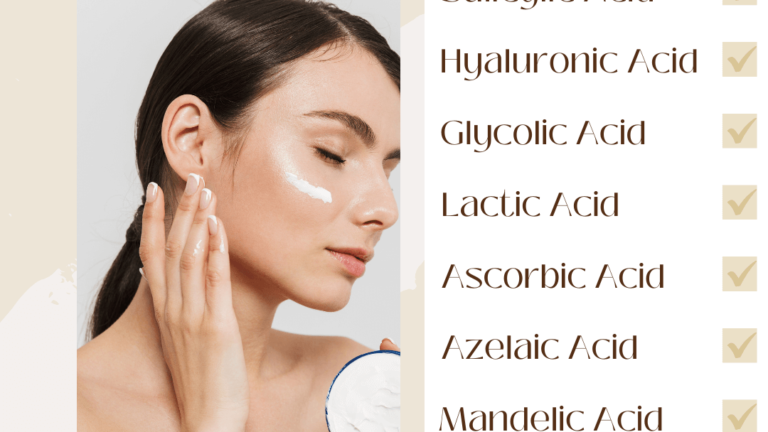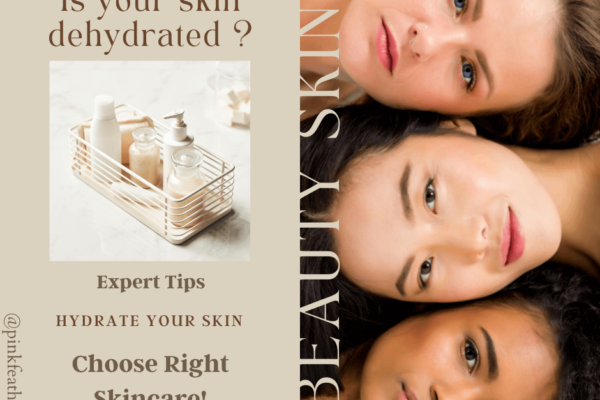Acids are the gamechanger in Skincare, they are great for the skin. Usually, Face acids sound like some kind of harsh burning liquid that would corrode your skin but promise they are not! They give your skin a whole new level of exceptional natural beauty as it’s a more effective and quicker process to achieve healthy skin goals. All facial Acids have unique elements that work on the particular skin concern. Most of our skincare products do have a combination of acids that we use daily.
In simple terms, Acids are a part of skincare often used for exfoliation. They help to improve the skin texture by giving smooth, even-toned, and radiant skin. There are two main groups of Facial Acids in Skincare, Alpha Hydroxy Acids aka AHA’s, and Beta Hydroxy Acids aka BHA’s. These Acids work on the upper layer of the skin. It easily gets dissolved between the skin cells and thereby giving a smoother and brighter surface. To put down simply, Facial Acids help to loosen the outmost layer of old skin cells and therefore give you a radiant glow.
It would be quite confusing to figure out between the type of AHA’s or BHA’s Acids to choose from. Well, this post will guide you to find the right acids for your Skincare needs. From Glycolic Acids to Salicylic Acids, we have covered component details of each facial Acids. You will get to know what each of these Acids does and how it helps to improve your skin concerns.
Let’s find out some of the types of Facial Acids used in Skincare:
Salicylic acid: Salicylic acid is a type of BHA’s, and is one of the most popular facial acids used to treat acne. Its Anti-bacterial and anti-inflammatory properties help to break the top layer of skin and thereby dissolving dead skin build-up and relieving clogged pores. It helps to reduce bacterial growth on the skin surface and in oil glands. Salicylic acid is found in every acne treatment product like spot gel, face wash, peels, creams, acne pads, etc. It helps to exfoliate the outer layer of the skin that is easily soluble, penetrating deeper into pores removing dead skin cells, and reducing sebum. Salicylic acids are beneficial for oily and acne-prone skin.
Suitable for: Salicylic Acid is great for anti-acne and skin exfoliation.
Hyaluronic acid: Hyaluronic acid is known for humectant properties, which means it retains moisture from the air on the skin surface, holds it, and delivers it back to the skin to absorb for deep hydration. This property can absorb up to 1000 times its weight in water which helps to trap moisture against the skin’s surface. Hyaluronic acid is in the moisturizing game as it helps skin to retain and preserve moisture thereby strengthening the skin barrier. The skin appears softer, smoother, and plumper. Hyaluronic Acid is used in moisturizers, hydrating serums, and anti-aging creams. The properties of Hyaluronic Acids allow plumping of the tissue due to water retention on the skin surface and soften the appearance of fine lines.
Suitable for: Hyaluronic acid is a great moisturizing agent that helps to plump skin to fill out wrinkles.
Glycolic Acid: Glycolic Acid is one of the AHA’s derived from Sugarcane and pineapple extracts. It is a game-changer acid in the Skincare regime. Glycolic acid has the smallest molecules and thus penetrates the skin that gently dissolves dead skin. It increases cell turnover thereby stimulating new collagen production, making skin smooth and supple. Glycolic acid serves as a great exfoliator due to deeper penetration of skin that removes dull and dead skin build-up from the surface of the skin. Thus, Glycolic acids help in regenerates collagen and elastin, tighten the skin, and even out the skin tone. Glycolic Acid is used in cleansers, moisturizers, serums, and treatment face masks. It is a gentler exfoliator than the usual scrub.
Suitable for: Glycolic acid is great for smoothing fine wrinkles, treating pigmentation and blemishes, and general exfoliation.
Lactic acid: Lactic acid derived from fermented milk is another AHA’s, that’s an even milder version of Glycolic Acid due to the less irritating formula. It’s one of the rare acids that’s known for moisturizing properties and gentle exfoliator. In ancient times, women preferred taking milk baths to improve the firmness softening, and moisturizing effect on the skin. Lactic acid can be found in body lotions, specifically to treat dry skin. flaky feet or keratosis pilaris. Therefore, Lactic acids can work as humectant, exfoliant, or as a mild peel depending upon the concentration in which it is been used.
Suitable for: It’s perfect for those with sensitive skin, seeking to reduce hyperpigmentation and softens fine lines of aging.
Ascorbic Acid: Ascorbic Acid also known as L-ascorbic acid is the Vitamin C. It’s one of the best antioxidants that reduce fines lines and is free from radicals. It’s one of the brightening agents that fades away the dark spots, stimulates collagen production, treats hyperpigmentation, and therefore it’s beneficial for mature skin. It’s strictly advised to keep vitamin C away from exposure to sunlight as it may reduce the stability of ascorbic acid. It should be used in the morning after cleansing and before moisturizing and sunscreen.
Suitable for: It’s great for all skin types looking for brightening skin, fading dark spots, treating free-radical and anti-aging.
Azelaic Acid: Azelaic acid is a dicarboxylic acid, derived from yeast that stays on your skin, is one of the common acids used for acne treatment due to its anti-bacterial properties. It helps in decreasing inflammation and treating rosacea, and melasma as Azelaic acid interrupts the pigment process in the skin. It treats and heals skin with anti-inflammatory properties by reducing redness and swelling.
Suitable for: It’s great for all skin types including sensitive skin to reduce inflammation, it treats hyperpigmentation, rosacea, and melasma.
Mandelic Acid: Mandelic acid is an extract of bitter almonds and grapes that has gentle exfoliation properties and fairly high acidity but a less irritating sensation. It’s one of the AHA’s categories with the largest molecule that allow penetrating skin slower and gentler. It’s less irritating than other acids and therefore ideal for sensitive skin. It regulates sebum production thereby improving the skin firmness and its elasticity. It also has anti-bacterial properties that treat acne and rosacea-prone skin, unclogs the pore, and gently exfoliate the skin.
Suitable for: It’s great for sensitive skin treating acne, melasma, rosacea, wrinkles, and hyperpigmentation.
Retinoic Acid: Retinoic acids also known as retinoids are derivatives of Vitamin A. Retinoic acid is known as liquid gold as an anti-aging product that helps in treating aging skin, reduces fine lines, and prevents the effects of wrinkles. Retinoic acid is the most powerful acid among retinol, retinaldehyde, retinyl palmitate, and all other derivatives of Vitamin A. Also, the quickest to work on skin concerns like helping in exfoliation, stimulating collagen production, reducing oiliness, improving pigmentation, and reducing acne. Retinoic acid is so strong that it can cause irritation, redness, dryness, and sometimes even flaking of the skin. While using Retinoic acid the skin becomes sensitive to sun exposure therefore retinoic acid is recommended to use in the PM routine of skincare and advise to wear sunscreen or SPF during the day. Seek dermatologist advice to understand which derivative of Vitamin A will work on your skin. Also, the concentration and correct of using retinoic acid.
Suitable for: It’s great for all skin types except for sensitive skin due to its high strength of power. It’s a key ingredient in Anti-Aging skincare, alleviates dullness, and clear acne also stimulates collagen production, and free radicals.
To tell whether acids are working: Your skin will look noticeably brighter, smoother, and firmer if acids are used in the skincare regime. An extensive list of acids has different roles to play with your skin concerns. Thus, it’s always advised to consult dermatologist experts to identify which acids will work with your skin type. Skin concerns like sun damage, dark spots, fine lines, dullness, and hyperpigmentation are well considered before opting for facial acids Application of acid will make skin sensitive to the sun, therefore be wise to wear broad-spectrum sunscreen during the day. However, overuse of facial acid will make the skin irritated, itchy, and dry.





